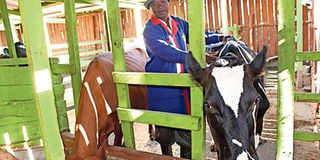Secret to running a thriving dairy enterprise in region where rain is scarce

Stephen Muriuki attends to his dairy cows in his farm named Fortune Dairy Farm in Meru. He currently rears six dairy cows, five which are Friesian and one Ayrshire, having started the farm in 2011. PHOTO | DAVID MUCHUI | NMG
What you need to know:
- Muriuki says he went into the venture after quitting his job as an accountant and trying his hand in horticulture farming
- Using sexed-semen, Muriuki has managed to grow his dairy herd to the current number, with the top producer yielding 32 litres at peak. Currently, he is milking four cows which offer him 75 litres a day.
- To ensure his cows feed well, Muriuki buys more than 10 feed ingredients and computes the total mixed ratio concentrate on the farm.
- He sells his milk to Meru Dairy at Sh35 per litre and spends about Sh800 a day to feed the cows. The dairy venture earns him at least Sh60,000 every month.
About 22km from Meru Town, off Ntugi market on the Meru-Nanyuki Road, wheat plants sway in sync with the blowing wind as one traverses the semi-arid Marurui village.
The little rainfall and insufficient water supply in the area overlooking Isiolo Town makes it unfriendly for farming activities.
Tall cacti trees and withering maize plantations that dot the plains are a testament of the water scarcity in the area.
It is in this tough environment that farmer Stephen Muriuki runs his thriving Fortune Dairy Farm, thanks to a water pan where he stores water.
He currently rears six dairy cows, five which are Friesian and one Ayrshire, having started the farm in 2011.
Muriuki says he went into the venture after quitting his job as an accountant and trying his hand in horticulture farming.
“I was employed in Nairobi as an accountant but the salary was so little. I decided to use my experience at one point as a salesperson in a dairy company to try and make money in farming,” he says, adding that the challenge, however, came from the location of his farm, which is arid.
He started with one cow which, according to him, was housed in a poorly done shed.
“When it rained, the cow would swim in mud. It was producing only 12 litres of milk,” Muriuki says, noting that he later gathered expertise from numerous visits to thriving dairy farms in Meru and Githunguri.
In 2016, he spent Sh280,000 to construct a standard house that can accommodate 16 cows.
The shed allows comfort and ease of movement, cleaning and feeding hence promising high milk yields.
“The water troughs fill up automatically to ensure constant supply of the commodity. They are also tiled for cleanliness. I learnt that cleanliness is paramount in dairy farming because it keeps away mastitis and other diseases.
With a well-designed structure, it is also easy to collect cow dung for biogas production,” he says.
Using sexed-semen, Muriuki has managed to grow his dairy herd to the current number, with the top producer yielding 32 litres at peak. Currently, he is milking four cows which offer him 75 litres a day.
DAM LINER
“Before I built a water pan holding 30,000 litres in 2016, I was spending Sh300 daily on buying water for my cows. I hired young men to dig the dam and placed a plastic material at the bottom,” he says, adding the project cost him Sh35,000 and he later replaced the plastic lining with a dam liner, whose ability to hold the rain water is superb.
To ensure his cows feed well, Muriuki buys more than 10 feed ingredients and computes the total mixed ratio concentrate on the farm.
“I spend Sh7,500 on 500kg of ingredients every month. For cows producing more than 20 litres of milk, I give 5kg of concentrates every morning. Those producing more than 20 litres get 8kg. I also give the cows 10kg of silage and 5kg of roughage in the morning and afternoon. I mix the feeds because I have not been able to produce sufficient silage,” explains Muriuki, who employs two workers.
He grows pumpkins for his calves, which he gives them after weaning, as well as maize for silage thanks to plenty supply of water from his water pan.
The pumpkins, according to him, are a good source of protein and energy for calves. They also contain vital vitamins for the growing calves.
“I feed my cows with dairy meal in the evening and morning after milking. I give the other feeds like silage during day. They should not feed for more than two hours to allow resting and production of milk,” he says.
He sells his milk to Meru Dairy at Sh35 per litre and spends about Sh800 a day to feed the cows. The dairy venture earns him at least Sh60,000 every month.
Muriuki says his plan is to become a breeder in the arid area to promote dairy farming by supplying well-bred heifers.
SNV Dairy consultant in Buuri constituency Emma Muthoni says dairy farming in semi-arid areas requires optimum use of rainfall to grow fodder besides having sufficient water storage.
“We advise farmers to grow fast-maturing maize varieties such as Katumani for silage. Farmers can also grow Calliandra and leuceana shrubs which are a good source of protein and do well in dry areas. Sorghum also thrives in semi-arid climate and can regrow after being cut,” Muthoni says, who adds that animals in dry areas are prone to tick-borne diseases.
Besides dairy, Muriuki also grows potatoes, snow peas and sugar snap using drip irrigation on the six acres.





